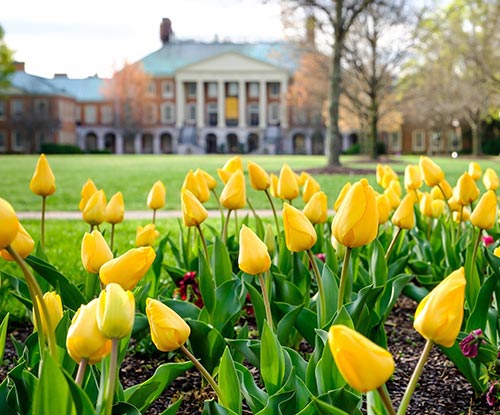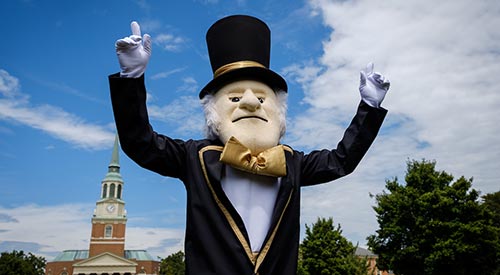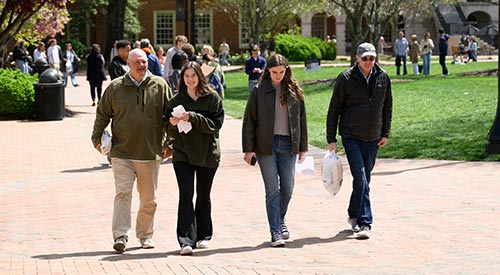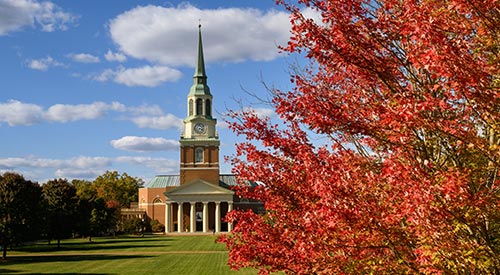English

English Degree
Bachelor of Arts, Minor
Program Type:
Major, Minor
Career Path:
Humanities
Program Site:
College or School:
Why study English?
While poring over poems, novels, and plays, English majors develop a critical and aesthetic understanding of English as a language, and of literature as an art form. Students learn a little of nearly everything along the way, and they learn it with the help of faculty who embrace undergraduate research.
- In recent years, two-thirds of English department tenured or tenure-track faculty have mentored at least one student-presented project at Undergraduate Research Day, the celebration of collaboration held on Family Weekend each year.
- The English department is a major stakeholder in Wake Forest University press, the premier publisher of Irish poetry in North America.
- English majors have won Rhodes, Truman, Goldwater, Marshall and Fulbright Scholarships.
The English degree is offered as a Bachelor of Arts (B.A.) and a minor.
What classes would I take?
Our model and curriculum educate the whole person and often help students discover interests they had never previously discovered. Students generally take 100-200 level courses during their first year of college, while registering for higher level courses as upperclassmen.
Sample courses* that you may take as a English student include:
100-200 level
- Poetry Workshop
- The Discipline of English Studies
- Literature Interprets the World
- British Literature before 1800
- American Literature
300 level
- History of the English Language
- Old English Language and Literature
- The Legend of Arthur
- Shakespeare
- Studies in 18th-Century British Literature
* Course availability and offerings can change at any time. Refer to the Academic Bulletin to view all major requirements.
What kind of experience will I gain?
A common misconception about English majors is that after they graduate the only thing they can do with their degree is go to graduate school or teach. With such a firm foundation of writing and communication skills; however, English majors are ready to hit the street and tackle a host of careers—after a few internships, that is. An internship within an intriguing industry will help translate academic skills directly into applicable workplace skills. Internships are great ways to get experience and help you narrow down your endless career possibilities.
Students in this program will develop the following skills:
- Aptitude for making critical observations
- Proficiency at reading, writing, and speaking
- Command of grammar and vocabulary
- Capable of reading analytically
- Creative thinking
- Ability to work toward deadlines
- Able to successfully make decisions
- Attention to detail
Are there extracurricular activities?
Joining a club or organization is a great way to get involved and do more with your major. Our English students participate in the following programs:
- Can I Poet
- Old Gold and Black
- The Howler
What kind of job can I get?
Careers that often interest English majors, and fields our graduates work in, include:
- Advertising Copywriter
- Attorney
- Author
- Book Store Manager
- Broadcast Journalist
- Copy Editor
- Court Reporter
- Editor
- Educator
- Entertainment Agent
- Human Resources Director
- Journalist
- Librarian
- Media Specialist
- Paralegal
- Press Representative
- Public Relations Director
- Publishing Assistant
- Technical Writer
The roster of English majors includes at least 50 who own their own businesses; more than 150 executives in other businesses; more than 200 lawyers and judges; and hundreds of other distinguished alumni.
Related Programs

Majors & Minors
Choose from more than 50 majors and over 60 minors to find your perfect fit.

Life at Wake
Take a moment to explore all the student experiences that make Wake Forest unique.

Virtual Tour
Can’t make it for a visit? No problem! Let us show you around campus virtually.

Keep in Touch
Let us know you’re interested in Wake Forest and we’ll do the rest.

Visit Campus
You truly can’t appreciate the beauty of our campus until you experience it for yourself.

Apply
Want to be considered for our next class of Demon Deacons? Here’s how to get started.
